Learn how to grow lemons at home to have that fresh citrus flavor throughout the year in your homestead kitchen.

This post contains affiliate links which means I make a small commission at no extra cost to you. See my full disclosure here.
Lemons and other citrus trees are the star of winter here on our zone 9 homestead. When everything else is dormant seemingly lifeless, citrus add a pop of color to the farm. I love seeing the bright orange, yellow, and pink rinds next to the evergreen glossy leaves. We have not only planted lemon trees, but also mandarines, oranges, limes, kumquats, and grapefruit. Our neighbors (an also our parents!) had an existing lemon tree on their property that was no longer producing fruit. Grey pruned, fertilized, and cared for it until it came back to life!


If you are looking to boost the appearance of your landscape, citrus trees make gorgeous ornamentals as well. We planted them among our cottage flowers for height and texture. Even in cold climates citrus trees can be brought indoors (if grown in pots), or grown in a greenhouse. During Christmas we love to make orange slice ornaments and orange and cranberry garlands since they are in season this time of year!

How grow lemons quick glance guide
| Plant type | Perennial |
| Origin | North-western India |
| Zones | 8 through 11 |
| Scientific name | Citrus limon |
| Other names | lemon tree, sweet lime, citrus, sweet lemon, citrus tree, citrus limetta. |
| Soil type | slightly acidic, well-drained loam or sandy loam soils |
| Soil pH | 5.8–6.5 |
| Sunlight requirement | Full sun |
| Bloom season | Fall, spring |
| Colors | Dark green, white, yellow |
| Max height | ~13 to 16 feet tall |
| Max width | ~15-20 feet wide |
| Watering requirements | Moderate |
| Fertilizer NPK | 8-8-8 |
| Days until germination | ~1-2 weeks from seed |
| Speed of growth | Fast (in ideal conditions) |
| Plant depth | 1.5 times the width of the root ball |
| Plant spacing | 12 to 25 feet (standard), 6 to 10 feet (dwarf) |
| Propagation | Seed, cuttings |
| Indoor plant | Yes |
| Outdoor plant | Yes |
| Grown in container | Yes |
| Beginner friendly | Yes |
| Care Level | Moderate |
| Flowering plant | Yes |
| Uses | Culinary, medicinal, decor, cleaning |
Why you should grow lemons
There are a whole host of reasons as to why you might want to grow lemons, but if you are still on the fence…here are some great reasons!
Lemons are good for you!
Lemons are commonly used to preserve foods, brighten up flavors in a heavy dish, or as a garnish. I like adding lemon to my water from lemon juice we have frozen while they are in season here on the homestead. Some of the health benefits of lemons, according to healthline, is that they:
- Improve heart health
- Can help prevent kidney stones
- Prevent anemia
- and can even lower the risk of cancer!
Lemons are versatile in the kitchen
Lemons are an incredibly useful fruit to have handy in a homesteading kitchen. Growing lemons right in your own yard, allows you to enjoy delicious lemony recipes like boysenberry lemonade popsicles, preserve food like home-canned tomatoes, and even make your own cleaning solutions!
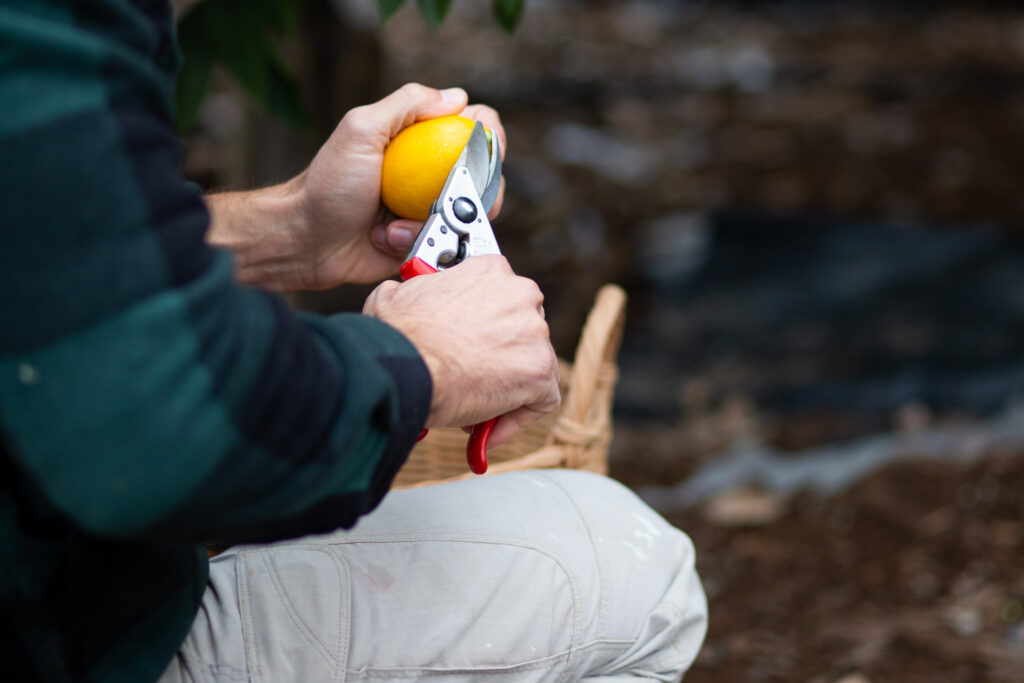
You’ll get a larger variety of lemons not available in a store
Typically in our grocery store we have one…you heard that…ONE variety of lemon to chose from. Sometimes during the year a Meyer lemon will become available to make that a whopping two varieties of lemon. Learning how to grow your own lemons gives you more control over what varieties you will have available in the kitchen. Here are some common varieties to choose from:
- Meyer
- Ponderosa
- Variegated Pink
- Avalon
- Verna
- Primofiori
- Lisbon
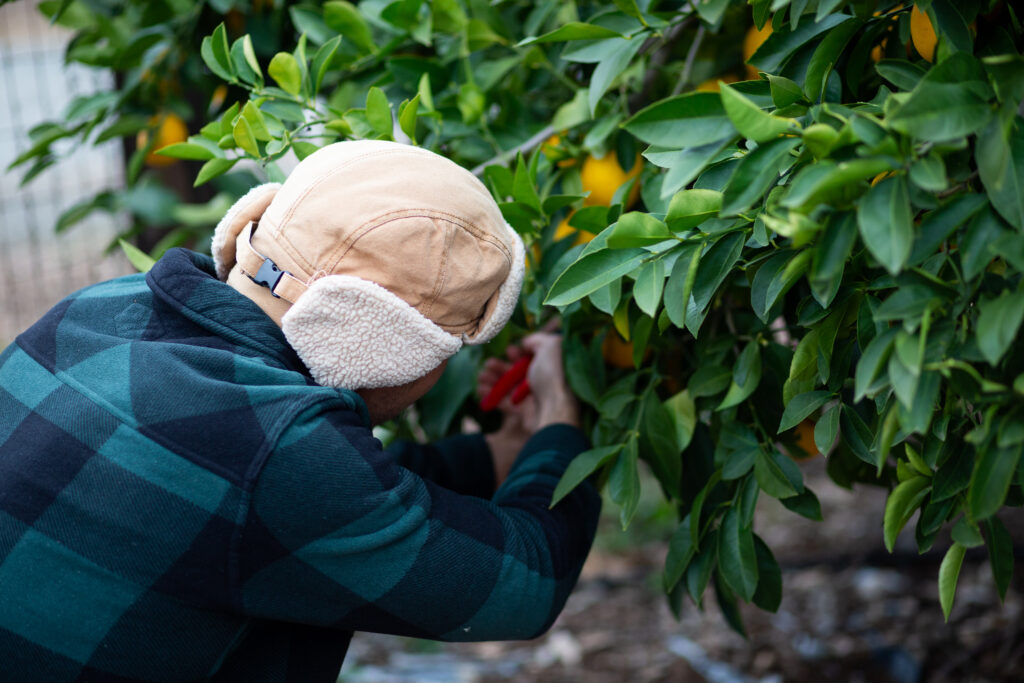
Lemon trees smell good
This reason alone is enough, in my book, to plant lemon trees around the yard. When a lemon tree is flowering it is one of the most beautiful scents!
You should grow lemon trees for the beauty
Along with the scent of all citrus trees is the beauty that they offer to the landscape. Lemon trees have a happy and bright appearance during the cold months, when lots of the yard is dormant. Not only are the fruit attractive, but also the glossy leaves. Lemon trees keep their leaves for most of the year, which make them look good all year round.
Homegrown lemons are truly organic
Even organic lemons from the grocery store can have pesticide residue on the peels. The only way to truly ensure that the fruit is organic is to grow it yourself or get it from a local grower you trust. We use the lemon zest in many recipes, so having pesticide free peels is important to us.

Ways to process lemons
After a few years, lemon trees can really start producing well. This is wonderful, but also challenging if you are not prepared to process the harvest. Our favorite ways to process lemons is to freeze them lemon juice into tablespoon size portions to use throughout the year. Here are some other ideas to put those lemons to good use!
- Dehydrated lemons-The dried lemon slices can be added to hot teas later…dried citrus are also beautiful around the holidays.
- Use the lemons in baked goods-the good thing about having a lemon bake-a-thon is most baked goods can be put into the freezer and pulled out later. We love lemon pound cake, lemon poppy seed muffins, or lemon rosemary cookies!
- Candied lemon peel-is an old fashioned candy that makes great gifts!
- Freeze dry them-Freeze drying lemons is a great way to preserve then for any number of things later on. They will be shelf stable for over 25+ years. If you are curious more about getting a home freeze dryer, you might want to check out our extremely honest freeze dryer review first.
- Lemon vinegar-make your own lemon vinegar cleaning solution by combining lemons to vinegar for a natural way to spruce up the home.
- Home-canned lemonade concentrate-this is one of my new favorite ways to preserve them our lemons. Putting up home canned lemonade concentrate is so convenient for those hot summer days when we want to make lemonade quick! Simply add water!
- Lemon-curd– is quite the treat if you haven’t had it before. We like to make it in the instant pot, and serve it with cookies, scones, or toast.
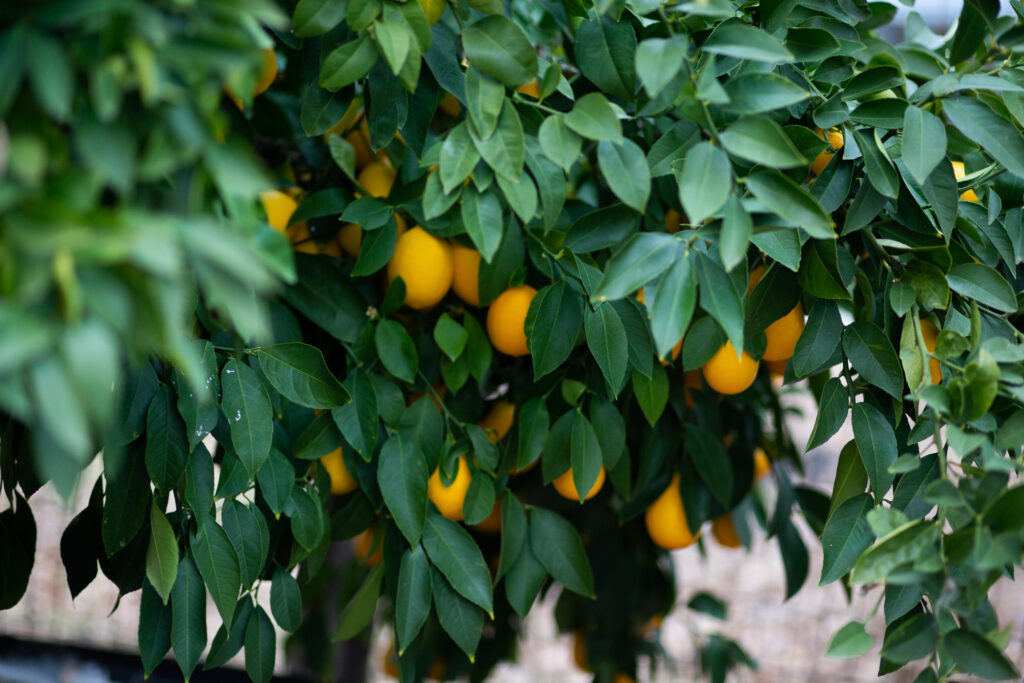
How to grow lemons
Lemons aren’t really hard to grow, but here are some tips:
- Choose a sunny location-The south side of a hill or building work great since these trees love the sun! Lemon trees need full sun exposure.
- Prep the soil-Lemon trees like well draining, slightly acidic soil so amend your soil as necessary. To help with drainage, lemon trees should be set slightly higher than ground. To do this build up the soil when prepping it.
- Dig a shallow hole- in the mound you prepared.
- Place the root ball in the hole-and cover it with soil. Lightly tamp down the soil around the root ball.
- Mulch heavily-with wood chips, or straw.
- Water well for the first few days-After the first few weeks, water once weekly.
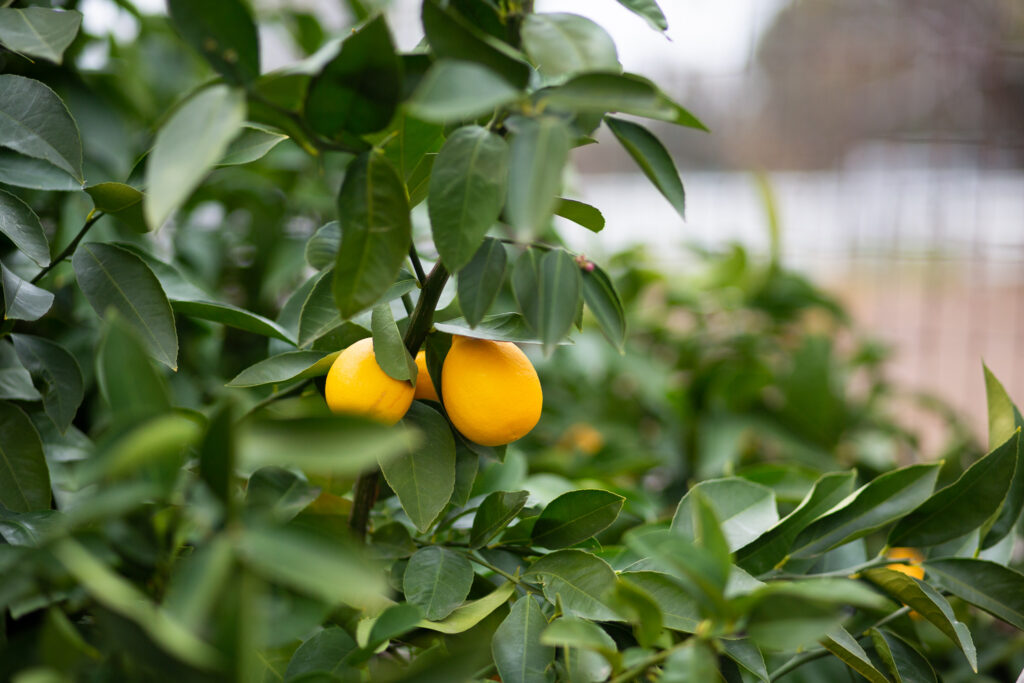
How to propagate lemon trees
For the best results, we do not recommend starting lemon trees from seed since they take longer to bear fruit that way. If you aren’t buying your lemon tree from a nursery consider propagating a tree from cuttings. Propagate lemons by taking large cuttings with sterile tools. Prepare the container with sterile potting soil and drainage holes.
Late spring and early summer are the best times to take lemon cuttings. Make sure to choose a branch that has no damage, no fruit or flowers, and at least two to three nodes along the stem. Pot up your cutting in your prepared pot. Lemon tree cuttings need warmth and high humidity, so cover the pot with a large clear plastic bag. Make sure to cut a few air holes in the bag.
Try to provide constant warmth and diffused light. After about 8 weeks give the tree a slight tug, if there is resistance the tree has rooted. Cut upon the bag to let the tree get used to normal humidity before removing the bag entirely. If you are planting outside harden off the tree first. Proceed planting the tree as per usual.

How to fertilize a lemon tree
Our favorite way to fertilize a lemon tree is by using home brewed compost tea. Various compost tea recipes are good for different types of plants. We brew a compost tea concentrate which works great throughout the garden, vineyard, and orchard. If you are curious about compost tea we wrote a guide for you.
Common Problems with growing lemons
Though lemon trees are worth the effort they do come with some challenges.They are the most sensitive of citrus trees when it comes to colder temperatures. Keep in mind that you will need to provide them with frost protection on cold nights.
Common lemon tree diseases
- Citrus Canker-Small lesions pop up on both sides of the leaves. They’re often raised and look like small craters. These cankers or spots look like water stains and have a yellow ring around them. If left unattended they will spread to the stems and fruits. This disease spreads easily by cross-contamination of plant tools, wind, and rain which makes it difficult to control.
- Sooty mold-grows on the sticky substance secreted by aphids, known as honeydew. This mold is black and while technically not harmful to the plants, it prevents photosynthesis, having devastating consequences. You’ll know if you have a sotty mold problem because your lemon tree will look like it has been dusted in ash.
- Anthracnose-A disease that will leave tan spots with a noticeable dark outline on the leaves and/or the fruit.
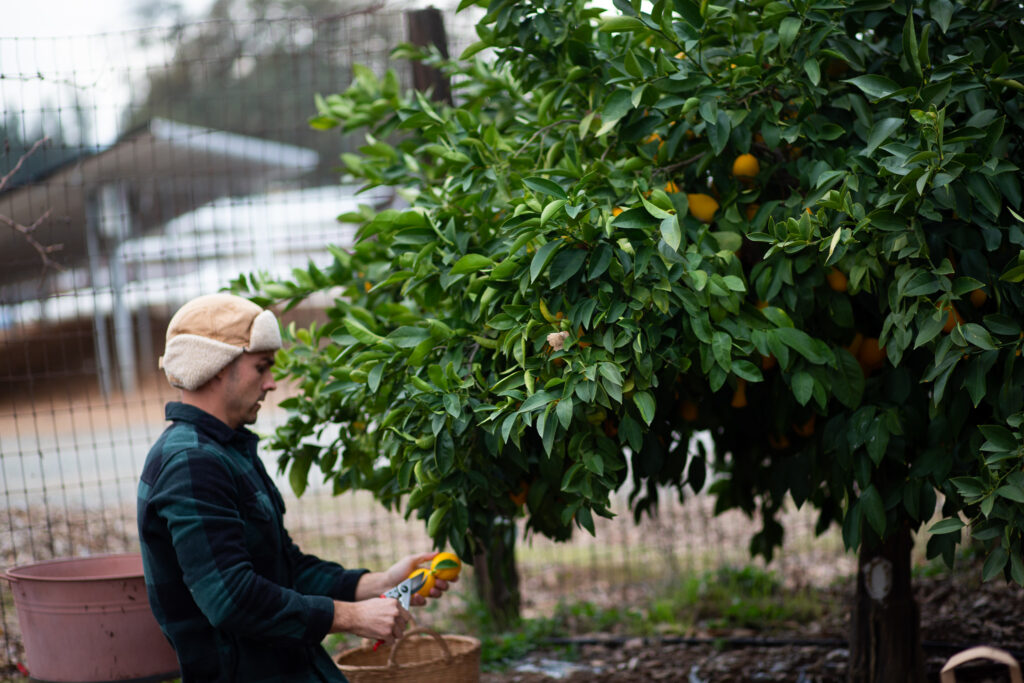
Common pests for lemon trees
- Aphids-even novice gardeners are familiar with the damage that aphids can do to plants. Watch out of these green to grey colored pests on the back side of leaves.
- Citrus leaf miners-These are moths who’s larvae will leave silvery trails on the citrus leaves which will distort the leaves.
How to Grow lemons FAQ
How to grow a lemon tree indoors
Lemon trees do great indoors! They will be comfortable in a container as long it provides adequate drainage and room for growth. Use a container that is around 3 to 5 feet. Keep in mind that lemons like well draining and slightly acidic soil. Keep the soil evenly moist and fertilize as needed. In the winter it may be necessary to supplement the tree with fluorescent grow lights since lemon trees love plenty of light. We like these ones because they are free standing–great for houseplants!
Pin it for later!

You May Also Like:
What is compost tea? How to make it.

Leave a Reply